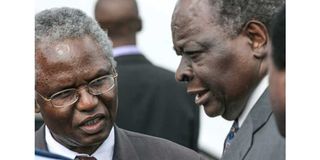Muthaura’s memoirs and images of Kibaki

Any Head of State after Mwai Kibaki will always have a harder time because he presided over a vibrant economy — the envy of any President even though every leader faces a different set of challenges. Ambassador Francis Muthaura has done Kenyans and generations to come a favour by documenting his life journey from his childhood on the slopes of Mt Kenya to his retirement from public service.
‘In the narrative books of the Bible, ‘Zion’ refers to a particular geographic region of Jerusalem — the section where King David built his residence. However, in later books of the Bible such as the prophets, ‘Zion’ shifts from a concrete referent to something more metonymic as it comes to refer to the entire city of Jerusalem.
The way, for example, ‘Hollywood’ might refer to an area of Los Angeles or, more abstractly, the movie industry generally. This is interesting to the rabbis… They note that ‘Zion’ might echo the word “zayon”, which refers to a dry and ruined place.
Therefore, the reasoning goes, ‘Zion’ becomes a shorthand for Jerusalem only in the later books of the Bible that emerge during exile. Only when the city is lost… only when its fields are salted and its people in bondage — only then is Jerusalem called ‘Zion.’… The city is ruined, the Temple is smashed, the people are scattered. In that absence, your longing may flourish into a new song, one that lives inside your heart. Call that place Zion — the place we love from afar. My lover is mine, and I am my lover’s, but only at a great distance,” so poignantly wrote Rebecca Sacks in her novel, The Lover, on the desire one has for a better country — one that is gone — whisked back into the past.
I thought of these words when Ambassador Dr Francis Muthaura launched his memoirs entitled, A Moving Horizon, on November 3. Serving in his time as Head of the Civil Service and Secretary to the Cabinet, he and the then-President Mwai Kibaki tried to build Kenya into a “Zion” but many Kenyans didn’t understand it at the time.
He writes that they were baffled by Kenyans, especially when the government lost the “banana vs orange” referendum of 2005. He writes that, “Since the banana campaign was led by 21 ministers plus the President and his Vice President and the orange side was led by only six ministers under the leadership of Raila Odinga, the banana campaign was optimistic that it would win because its leaders’ influence had a wider population cover than the six.
“The orange side had teamed up with the opposition Kanu to oppose the draft Constitution in the referendum. When the referendum was held on November 21, 2005, the government side lost by garnering 42 per cent against 58 per cent... What was even of greater concern was the political division within the country. It was ironical that while the economy was doing very well the political division in the country was getting wider. Indeed, the outcome split the country into two…”
While there are most likely many legitimate reasons why the referendum flopped, that part “while the economy was doing well” is a place every Kenyan would wish to return to (holding everything else constant). It’s like the Zion novelist Rebecca Sacks describes as a place we long for only when the city is ruined, the temple is smashed, and the people are scattered.
A Zion we didn’t see as a great homeland then because we complained a lot under Kibaki (maybe he wasn’t a great politician). Now, the bloom is off the rose, and we are having our own version of Armageddon — over-taxation and the high cost of living has hit us with the force of a thunderclap — we are a nation in a bruising rendezvous with destiny.
I doubt anyone can read the memoirs without thinking about Kibaki, whose presidency many now acknowledge to have been great, and some even romanticise. In retrospect, Kibaki’s presidency was like sweet musical notes that wash over sheets of silk, notes as soft as cashmere, floating melodies that carry the promise of good days — a world of lightness, ease, and great economic growth.
Any Head of State after Kibaki will always have a harder time because he presided over a vibrant economy — the envy of any President even though every leader faces a different set of challenges. Muthaura has done Kenyans and generations to come a favour by documenting his life journey from his childhood on the slopes of Mt Kenya to his retirement from public service. He has served Kenya in various positions from taking on diplomatic assignments in Europe and at the United Nations to returning to the Civil Service where he rose to the office of Head of the Civil Service and Secretary to the Cabinet.
He also covers the not-so-glossy parts of his life when he is indicted for crimes against humanity at the International Criminal Court (ICC). Since Ambassador Muthaura was Kibaki’s “Fixer”, the former President, even when not mentioned, still looms large as many Kenyans remember him and his government (at least looking back) with kindness. Maybe that happens to all presidents. Maybe not. Whatever. We look forward to better days. May the future be kind to us.
In Rebecca Sacks’ earlier-mentioned novel, a character in exile says forlornly, “This year we are slaves, next year may we be free in Jerusalem.” Most Kenyans, this year, are like slaves to tough economic times, next year may we be free in our own “Jerusalem”– the place we have always dreamt to be.
- The writer is a book publisher based in Nairobi. [email protected]





